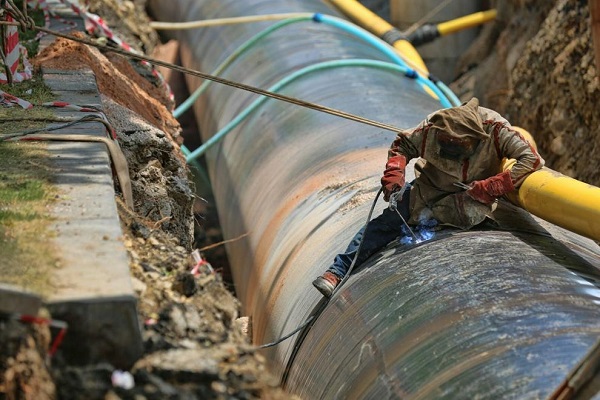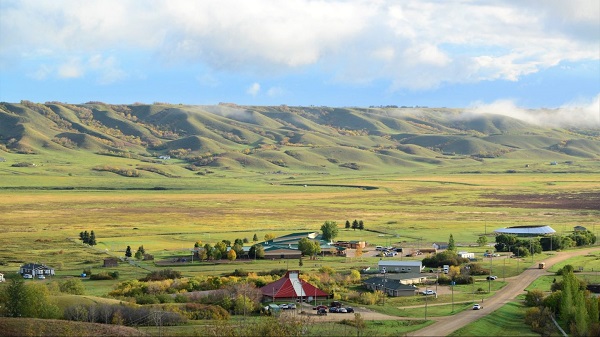Energy
Trial underway in energy company’s lawsuit against Greenpeace

From The Center Square
A trial is underway in North Dakota in a lawsuit against Greenpeace over its support for protests of the Dakota Access Pipeline.
Filed by Texas-based Energy Transfer, the lawsuit alleges Greenpeace in 2016 engaged in or supported unlawful behavior by protesters of the pipeline, while also spreading false claims about it. Greenpeace, according to Energy Transfer, spread falsehoods about the pipeline and conspired to escalate what were small, peaceful protests illegal activity that halted the project in 2016.
Energy Transfer – which is seeking hundreds of millions of dollars in damages – claims the alleged actions caused more than $100 million in financial difficulties for the pipeline.
Greenpeace denies any wrongdoing, arguing the case is about Americans’ First Amendments rights to free speech and to peacefully protest, and about corporations trying to silence critics.
Energy Transfer told The Center Square that its lawsuit “is about recovering damages for the harm Greenpeace caused” the company.
“It is not about free speech,” Energy Transfer said in an emailed statement to The Center Square. “Their organizing, funding, and encouraging the unlawful destruction of property and dissemination of misinformation goes well beyond the exercise of free speech. We look forward to proving our case and we trust the North Dakota legal system to do that.”
Last week, Greenpeace filed for a change of venue, claiming that the environmental group may not get a fair trial in Morton County, where the trial is being held.
“The Greenpeace defendants have said from the start of this case that it should be heard away from where the events happened,” said Daniel Simons, senior legal counsel for Greenpeace, in another statement emailed to The Center Square. “After three motions for a venue change were refused, we now feel compelled to ask the Supreme Court of North Dakota to relieve the local community from the burden of this case and ensure the fairness of the trial cannot be questioned.”
The pipeline was completed in 2017 after several months of delays.
Greenpeace has voiced concerns about the environmental impacts that the Dakota Access Pipeline will have in areas where it is installed. Energy Transfer/Dakota Access Pipeline says that, among other things, safety is its top priority and that it is committed to being a good neighbor, business partner, and valued member of local communities that the energy company says will benefit economically.
Canadian Energy Centre
Saskatchewan Indigenous leaders urging need for access to natural gas

Piapot First Nation near Regina, Saskatchewan. Photo courtesy Piapot First Nation/Facebook
From the Canadian Energy Centre
By Cody Ciona and Deborah Jaremko
“Come to my nation and see how my people are living, and the struggles that they have day to day out here because of the high cost of energy, of electric heat and propane.”
Indigenous communities across Canada need access to natural gas to reduce energy poverty, says a new report by Energy for a Secure Future (ESF).
It’s a serious issue that needs to be addressed, say Indigenous community and business leaders in Saskatchewan.
“We’re here today to implore upon the federal government that we need the installation of natural gas and access to natural gas so that we can have safe and reliable service,” said Guy Lonechild, CEO of the Regina-based First Nations Power Authority, on a March 11 ESF webinar.
Last year, 20 Saskatchewan communities moved a resolution at the Assembly of First Nations’ annual general assembly calling on the federal government to “immediately enhance” First Nations financial supports for “more desirable energy security measures such as natural gas for home heating.”
“We’ve been calling it heat poverty because that’s what it really is…our families are finding that they have to either choose between buying groceries or heating their home,” Chief Christine Longjohn of Sturgeon Lake First Nation said in the ESF report.
“We should be able to live comfortably within our homes. We want to be just like every other homeowner that has that choice to be able to use natural gas.”
At least 333 First Nations communities across Canada are not connected to natural gas utilities, according to the Canada Energy Regulator (CER).
ESF says that while there are many federal programs that help cover the upfront costs of accessing electricity, primarily from renewable sources, there are no comparable ones to support natural gas access.
“Most Canadian and Indigenous communities support actions to address climate change. However, the policy priority of reducing fossil fuel use has had unintended consequences,” the ESF report said.
“Recent funding support has been directed not at improving reliability or affordability of the energy, but rather at sustainability.”
Natural gas costs less than half — or even a quarter — of electricity prices in Alberta, British Columbia, Ontario, Manitoba and Saskatchewan, according to CER data.
“Natural gas is something NRCan [Natural Resources Canada] will not fund. It’s not considered a renewable for them,” said Chief Mark Fox of the Piapot First Nation, located about 50 kilometres northeast of Regina.
“Come to my nation and see how my people are living, and the struggles that they have day to day out here because of the high cost of energy, of electric heat and propane.”
According to ESF, some Indigenous communities compare the challenge of natural gas access to the multiyear effort to raise awareness and, ultimately funding, to address poor water quality and access on reserve.
“Natural gas is the new water,” Lonechild said.
2025 Federal Election
MORE OF THE SAME: Mark Carney Admits He Will Not Repeal the Liberal’s Bill C-69 – The ‘No Pipelines’ Bill

From EnergyNow.Ca
Mark Carney on Tuesday explicitly stated the Liberals will not repeal their controversial Bill C-69, legislation that prevents new pipelines being built.
Carney has been campaigning on boosting the economy and the “need to act forcefully” against President Donald Trump and his tariffs by harvesting Canada’s wealth of natural resources — until it all fell flat around him when he admitted he actually had no intention to build pipelines at all.
When a reporter asked Carney how he plans to maintain Bill C-69 while simultaneously building infrastructure in Canada, Carney replied, “we do not plan to repeal Bill C-69.”
“What we have said, formally at a First Ministers meeting, is that we will move for projects of national interest, to remove duplication in terms of environmental assessments and other approvals, and we will follow the principle of ‘one project, one approval,’ to move forward from that.”
“What’s essential is to work at this time of crisis, to come together as a nation, all levels of government, to focus on those projects that are going to make material differences to our country, to Canadian workers, to our future.”
“The federal government is looking to lead with that, by saying we will accept provincial environmental assessments, for example clean energy projects or conventional energy projects, there’s many others that could be there.”
“We will always ensure these projects move forward in partnership with First Nations.”
Tory leader Pierre Poilievre was quick to respond to Carney’s admission that he has no intention to build new pipelines. “This Liberal law blocked BILLIONS of dollars of investment in oil & gas projects, pipelines, LNG plants, mines, and so much more — all of which would create powerful paychecks for our people,” wrote Poilievre on X.
“A fourth Liberal term will block even more and keep us reliant on the US,” he wrote, urging people to vote Conservative.
-

 2025 Federal Election1 day ago
2025 Federal Election1 day agoMORE OF THE SAME: Mark Carney Admits He Will Not Repeal the Liberal’s Bill C-69 – The ‘No Pipelines’ Bill
-

 2025 Federal Election19 hours ago
2025 Federal Election19 hours ago‘I’m Cautiously Optimistic’: Doug Ford Strongly Recommends Canada ‘Not To Retaliate’ Against Trump’s Tariffs
-

 2025 Federal Election24 hours ago
2025 Federal Election24 hours ago‘Coordinated and Alarming’: Allegations of Chinese Voter Suppression in 2021 Race That Flipped Toronto Riding to Liberals and Paul Chiang
-

 International2 days ago
International2 days agoTrump’s ‘Golden Dome’ defense shield must be built now, Lt. Gen. warns
-

 Business11 hours ago
Business11 hours agoCalifornia planning to double film tax credits amid industry decline
-

 Business2 days ago
Business2 days agoSaskatchewan becomes first Canadian province to fully eliminate carbon tax
-

 Business19 hours ago
Business19 hours agoCanada may escape the worst as Trump declares America’s economic independence with Liberation Day tariffs
-

 2025 Federal Election2 days ago
2025 Federal Election2 days agoMark Carney refuses to clarify 2022 remarks accusing the Freedom Convoy of ‘sedition’





